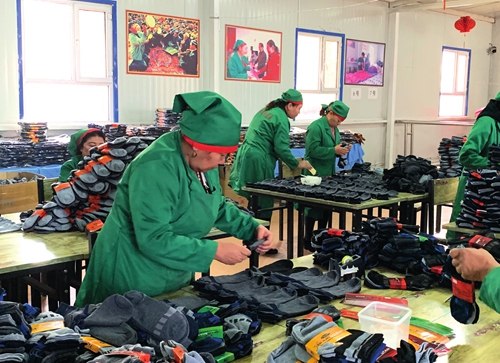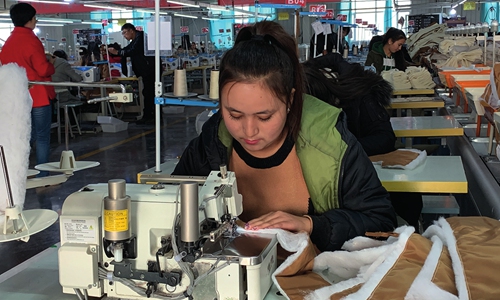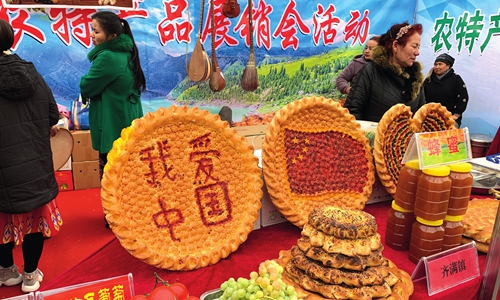HOME >> BUSINESS
Companies relocate to southern Xinjiang
By Li Xuanmin in Aksu Source:Global Times Published: 2019/11/25 17:58:41
Firms from South and East China open businesses in the region, eyeing huge labor force and geographic advantage

Workers manufacture socks at Hongyang Textile Co in Kuqa County, Northwest China's Xinjiang Uyghur Autonomous Region, on Friday. Photo: Li Xuanmin/GT

An employee at work in a Xinjiang Jinliyuan Clothing Co factory in Aksu, Xinjiang, on Saturday Photo: Li Xuanmin/GT

Agricultural products and king-sized pies are displayed at a trade fair in Kuqa County, Xinjiang, on Saturday. Photo: Li Xuanmin/GT
Zhao Honggen, manager of a sock-manufacturing plant in Shaoxing, East China's Zhejiang Province, decided in 2016 to open a production line in Kuqa County in Northwest China's Xinjiang Uyghur Autonomous Region. Though the prospect was exciting, he was nervous.
"The local officials in Zhejiang talked with me then, encouraging me to take the lead as a Party member by setting up factories in southern Xinjiang's Aksu Prefecture and help provide jobs there," Zhao recalled. Zhejiang is the province tasked with assisting Aksu Prefecture under a central government program.
During the talk, Zhao was impressed by the inexpensive local labor forces as well as the Xinjiang government's determination to invite business to the region. However, he was still worried by questions concerning the extent to which the promised favorable policies would translate into actions, and how quickly local labor forces would become highly skilled.
Now, three years after opening shop, Zhao's concerns have been dispelled.
His company, Hongyang Textile Co, is located at an industrial park for micro and small-businesses in Kuqa County under the administration of Aksu Prefecture. It has seen export orders climb by more than $100,000 this year despite impact from the China-US trade war.
His export destinations have shifted from the US to Panama and Central Asian countries, taking advantage of Xinjiang's geographic position as a core area of the Silk Road Economic Belt and as a bridge to Central Asia.
The company now has 164 employees, 158 of whom are Uyghur. The Global Times learned that their average monthly income is about 2,000 yuan ($284), with some experienced workers able to make 4,000 yuan a month. Last year, the manufacturer helped lift some 30 households out of poverty.
Hongyang Textile is just one example of how companies in East and South China have migrated parts of their businesses to southern Xinjiang in recent years.
In the first nine months of 2019, Aksu Prefecture welcomed 523 business projects from outside Xinjiang, up 24.23 percent year-on-year, bringing an investment of 45.82 billion yuan, according to data provided by the local government. The region has planned 580 local projects to attract outside investment.
Some businesspeople are attracted by the local government's subsidies and policies, while others, like Zhao, are lured by relatively affordable labor forces and the region's geographic location which allows for diverse export markets.
But those entrepreneurs do not come empty-handed.
They teach new skills, raise local incomes and unite different ethnic groups in southern Xinjiang, where the Uyghur ethnic group accounts for about 80 percent of the population.
Most importantly, the presence of their businesses brings wealth and stability to southern Xinjiang, a region once plagued by terrorism and extremism.
Relocating to Xinjiang
Walking around the Guizi business park where Zhao's factory is located, slogans advocating ethnic unity can be seen painted on many walls. One banner hanging outside the factory reads, "People of all ethnic groups should unite like pomegranate seeds," comparing the importance of ethnic unity to agricultural production.
Zhang Wenjun, an official of the Kuqa Economic and Technological Development Zone which oversees the Guizi business park, told the Global Times on Friday that such an industrial park for small and micro-businesses is unique in southern Xinjiang. "It is an important means for local governments to solve employment issues," he noted.
Shohrat Zakir, chairman of the Xinjiang regional government, vowed at the region's annual two sessions in January that maintaining social stability will continue to be an important task in 2019, Xinjiang Daily reported.
Patigu Yusufu, a 55-year-old Uyghur worker, told the Global Times that she is more than happy to work at the industrial park. Yusufu, now a Party member, did not have any income before local officials found her a job at the factory in 2017. Now, she can package more than 4,000 pairs of socks each day, which brings her a monthly income of around $420 - higher than her husband's.
By working together, Han and Uyghur employees form deep connections, according to Yusufu. "We're like a family, we care for each other a lot," she said.
Some industrial parks are created to receive and accommodate companies moving from the south, according to officials. As such, most industrial parks provide free factories and dormitory housing for firms coming from outside Xinjiang. Additionally, they also offer discounts for electricity fees and social insurance payments.
"We want to tap into Xinjiang's advantage to attract as many as companies as we can. Xinjiang may lack something but it does not lack land, so the local government provides all kinds of fixed-asset investment. What enterprises need to do is to come with equipment and technology," Zhang said.
Take Zhao's company as an example. Hongyang Textile has been using a 5,000-square-meter factory free of charge for three years, and the only investment Zhao made to start up the business was 15 million yuan, which was used to source 253 pieces of sock-manufacturing equipment. The local government also purses 60 percent of the company's social insurance payment every year, according to Zhao.
"It is very easy to set up a business in southern Xinjiang. The business environment is very friendly and local officials are very responsive," Zhao said.
Labor costs are also significantly lower in Xinjiang. Tian Yong, a senior executive of chemical firm Yuxiang Huyang Co, told the Global Times that it only costs about 2,000 yuan to hire a worker in Aksu, while in Southwest China's Sichuan Province, labor fees and social insurance could add up to at least 6,000 yuan to hire a worker.
The Sichuan-based company, which produces chemical products such as melamine and urea, opened a new factory in Xayar County under the administration of Aksu Prefecture in September 2009. Now, its industrial output accounts for 70 percent of Xayar's total, with sales hitting a record high of 1.2 billion yuan in 2018.
"We're in talks with downstream companies in East China's Fujian Province and South China's Guangdong Province to bring more industrial chains, such as high-grade melamine tableware manufacturing, into southern Xinjiang," Tian said. Projects will begin in the first half of 2020.
Yuxiang Huyang now employs 1,500 workers, 500 of whom are Uyghur earning 40,000 yuan a year. The establishment of the plant has contributed significantly to the local drive to reduce poverty.
Educating locals
Almost all local companies in southern Xinjiang, including Yuxiang Huyang and Hongyang Textile, organize weekly classes for Uyghurs, covering the Chinese language and tech education.
But some executives are disappointed at the progress of the tutoring, which they said "has been moving very slowly among the minority workers." This in turn drags down production efficiency and weighs on profitability.
"It's harder than we expected to nurture local skilled labor in southern Xinjiang, and we still have to rely on technical experts from Sichuan after a decade of localization," Tian complained. "This really is a Long March."
The chemical producer has had to lower its employment standards repeatedly. Now, any Uyghur candidate who can write an article in the Chinese language will be admitted to the company. Yuxiang Huyang then provides training courses to qualify employees to undertake relevant work at the factory.
Xinjiang Jinliyuan Clothing Co, a Shandong-based textiles manufacturer that established a new factory in Aksu in 2016, has been hosting tri-weekly classes for minority employees for the last three years. But now, with the same employment levels, the capacity of the Xinjiang factory is only about 40 percent that of the plant in Shandong.
"At first, we thought it would be 70 percent after three years of training. This is far lower than our expectations," Zhang Jie, general manager of Jinliyuan, told the Global Times. He noted that the efficiency issue has made it difficult for Jinliyuan to make a profit. Last year, the textiles manufacturer incurred a loss of more than 9 million yuan.
Despite such difficulties, some expressed that things are getting better.
Zhao said that through their ongoing education courses, some Uyghur workers have formed the idea, "Work hard to live a better life," and the factory has seen a significant drop in employment mobility this year.
"The process of forming a local skilled labor force is underway, despite being slow. In the future, the Xinjiang factory will also be able to produce high value-added sock products to increase profit margins," Zhang said.
He also plans to export such products to snap markets in Russia and other countries along the Belt and Road Initiative, via the China-Europe freight train.
In September, Aksu Railway Station was approved for a direct link to the China-Europe freight train route under a model of consolidated loading and shipping in southern Xinjiang. The trains, which depart from Urumqi Western Station with the aid of government subsidies, operate twice a week.
The linkage to the route allows Xinjiang exporters to reduce the shipping time to Europe by roughly 10 to 20 days.
Despite the outbound logistics convenience, some entrepreneurs also long for transportation subsidies when shipping materials into southern Xinjiang, as the region lacks a complete industrial chain.
Despite Aksu's status as China's largest cotton production base, Zhao pointed out that all raw materials, parts and equipment used in the process of making socks are purchased from Zhejiang, which is about 4,700 kilometers from Aksu.
"We cannot find such materials in Xinjiang - even dyeing needs to be completed in Zhejiang. Transportation costs have eaten up our profit," Zhang explained, urging the local government to step in and devise more measures to help create an industrial chain for the textiles industry.
Posted in: INDUSTRIES,ECONOMY